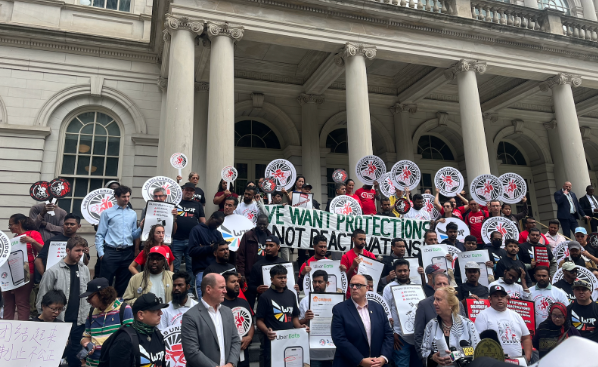
BY SARAH O’CONNELL
Just months after NYC delivery drivers saw a minimum pay hike go into effect, members of the Los Deliveristas Unidos campaign crowded the steps of New York City Hall on September 12. Deliveristas, along with advocates, rallied in support of legislation that would prohibit delivery apps from deactivating drivers’ accounts without just cause or legitimate economic reason.
Intro 1332, which was introduced to City Council following the rally, would give protections to the city’s estimated 65,000 delivery workers. After the minimum hourly wage for app-based delivery workers was raised to $21.44 in April 2025, many drivers alleged their accounts were suddenly deactivated, causing them to lose their source of income.
Workers Justice Project, the organization behind the Los Deliveristas Unidos campaign, began a campaign in 2023 for minimum pay rates for deliveristas, who without wage protections made an average of just $5.39 per hour before tips. The campaign’s pressure on Mayor Eric Adams was successful. In June of 2023, Adams announced that New York City would be the first in the country to implement a minimum pay rate for delivery drivers – starting at $17.96, with gradual raises until the pay scale was fully phased in in April 2025.
In response to the historic win for deliveristas, Uber, DoorDash, and Gruhhub sued New York City. The apps argued that faulty data was used in determining minimum pay rates, and that the raise would have negative effects on customers and restaurant partners. Each platform filed a temporary restraining order request to block the pay raise from going into effect, an action that was later denied by a New York state judge.
Since the minimum pay rate was first implemented in 2023, delivery apps have paid drivers an additional $700 million in wages.
Ligia Guallpa, the co-Executive director of Workers Justice Project, said that the deactivations were another way for delivery apps to “undermine” the pay raise.
Drivers had reported that the platforms had been deactivating them for years without due cause, Guallpa said. But “since we passed minimum pay, they have been more aggressive. Not because they just don’t care about that human being, but because it’s also about protecting their pockets,” said Guallpa. She added, “They continue to pocket millions and billions on the backs of workers.”
The bill also requires the apps to give drivers 14-day notice before their account is deactivated unless they engaged in “egregious misconduct.” Kassandra Perez-Desir, Doordash Senior Manager of Government Relations, responded in a statement saying this gives drivers who “abuse” the platform the opportunity to continue for the duration of the notice period.
Freddi Goldstein, who oversees Uber’s policy work, said in testimony to the City Council that Uber only used deactivations in “last resort” situations, and that drivers were given warnings that could be appealed before their accounts were permanently deactivated. Goldstein also cited that in 2025, only 2% of Uber delivery workers in NYC had their account permanently deactivated monthly, mostly as a result of fraudulent activity or theft.
However, many deliveristas report not receiving any warning before being deactivated. Jose Muños, a deliverist with Grubhub, arrived at a pickup location one day and found himself unable to login to his account. He said Grubhub did not give a reason or any warning for the sudden deactivation.
Another deliverista, Jose Valdez, stated that as a reward for his dedication to his job, his Grubhub account was deactivated without clear reason or concrete evidence. “The lack of transparency in this process has left me without my primary source of income, directly impacting my livelihood and my family’s wellbeing,” said Valdez.
In testimony to the City Council, Rebecca Lynch, deputy director of Worker’s rights within the city Comptroller’s Bureau of Labor Law, said that after minimum pay was implemented the apps began using “algorithmic systems for ‘on-time delivery’ and acceptance of trips, which are used by the companies to rate deliveristas.” She added, “Those ratings, in turn , result in deactivations, often with little or no chance of appeal.”
Lynch also said that even when drivers get a chance to appeal deactivations, many have difficulty successfully navigating the process, which can drag on for months without resolution.
This past summer, when the Worker Justice Project tried to contact Grubhub and appeal for 60 drivers who had been deactivated, Grubhub denied the request. That is, until New York City Comptroller Brad Lander wrote a letter to Grubhub, and the workers were reinstated, according to Guallpa.
Lander also called the deactivations “punishment” for the protections workers had won. The fact that delivery apps would fight a bill that “just gives workers an opportunity to contest an unfair firing, to get a reason, to have some time, that really tells you all you need to know about what these companies are trying to do,” he said.
“If they’re going to use the gig economy for their own pocketbooks,” said Lander, “then the least that City Council can do is make sure deactivation protections are in place.”
